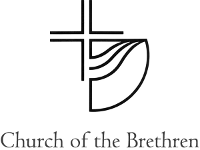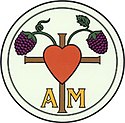
The environmental movement, is a social movement that aims to protect the natural world from harmful environmental practices in order to create sustainable living. Environmentalists advocate the just and sustainable management of resources and stewardship of the environment through changes in public policy and individual behavior. In its recognition of humanity as a participant in ecosystems, the movement is centered on ecology, health, as well as human rights.

The Church of the Brethren is an Anabaptist Christian denomination in the Schwarzenau Brethren tradition that was organized in 1708 by Alexander Mack in Schwarzenau, Germany during the Radical Pietist revival. The denomination holds the New Testament as its only creed. Historically, the church has taken a strong stance for nonresistance or Christian pacifism—it is one of the three historic peace churches, alongside the Mennonites and Quakers. Distinctive practices include believer's baptism by forward trine immersion; a threefold love feast consisting of feet washing, a fellowship meal, and communion; anointing for healing; and the holy kiss. Its headquarters are in Elgin, Illinois, United States.
Green anarchism, also known as ecological anarchism or eco-anarchism, is an anarchist school of thought that focuses on ecology and environmental issues. It is an anti-capitalist and anti-authoritarian form of radical environmentalism, which emphasises social organization, freedom and self-fulfillment.
The National Council of the Churches of Christ in the USA, usually identified as the National Council of Churches (NCC), is the largest ecumenical body in the United States. NCC is an ecumenical partnership of 38 Christian faith groups in the United States. Its member communions include mainline Protestant, Eastern Orthodox, African-American, evangelical, and historic peace churches. Together, it encompasses more than 100,000 local congregations and 40 million adherents. It began as the Federal Council of Churches in 1908, and expanded through merger with several other ecumenical organizations to become the National Council of Churches in 1950. Its Interim President and General Secretary is Bishop Vashti Murphy McKenzie.
Peace churches are Christian churches, groups or communities advocating Christian pacifism or Biblical nonresistance. The term historic peace churches refers specifically only to three church groups among pacifist churches:
Ronald James Sider, was a Canadian-born American theologian and social activist. He was the founder of Evangelicals for Social Action, a think-tank which seeks to develop biblical solutions to social and economic problems through incubating programs that operate at the intersection of faith and social justice.
John Clement Whitcomb Jr. was an American theologian and young Earth creationist. Along with Henry M. Morris, he wrote The Genesis Flood, which influenced many conservative American Christians to adopt flood geology.

The Methodist Episcopal Church Board of Temperance, Prohibition, and Public Morals was a major organization in the American temperance movement which led to the introduction of prohibition in 1920. It was headed for many years by Clarence True Wilson.
Ecospirituality connects the science of ecology with spirituality. It brings together religion and environmental activism. Ecospirituality has been defined as "a manifestation of the spiritual connection between human beings and the environment." The new millennium and the modern ecological crisis has created a need for environmentally based religion and spirituality. Ecospirituality is understood by some practitioners and scholars as one result of people wanting to free themselves from a consumeristic and materialistic society. Ecospirituality has been critiqued for being an umbrella term for concepts such as deep ecology, ecofeminism, and nature religion.
Ecotheology is a form of constructive theology that focuses on the interrelationships of religion and nature, particularly in the light of environmental concerns. Ecotheology generally starts from the premise that a relationship exists between human religious/spiritual worldviews and the degradation or restoration and preservation of nature. It explores the interaction between ecological values, such as sustainability, and the human domination of nature. The movement has produced numerous religious-environmental projects around the world.
BCA Study Abroad began in 1962 as a non-profit provider of academic, language, and cultural immersion studies for undergraduates from a consortium of colleges and universities.
Christian views on environmentalism vary among different Christians and Christian denominations.
The Rev. Dr. Larry D. Pickens is a graduate of North Park University and holds a master of theology degree and master of divinity degree from Garrett-Evangelical Theological Seminary, a doctorate in ministry from Chicago Theological Seminary, and a Juris Doctor from DePaul University College of Law. Larry is the executive director of the Pennsylvania Council of Churches. Larry is the former general secretary of the General Commission on Christian Unity and Interreligious Concerns of the United Methodist Church. During his tenure as the ecumenical staff officer these significant events took place. Pickens served as the Ecumenical Director of The Lehigh Conference of Churches in Allentown, Pennsylvania from 2014-20.

Vernard Marion Eller was an American author, Christian pacifist and minister in the Church of the Brethren. Born in Everett, Washington, and raised in Wenatchee, Eller graduated from the University of La Verne and Bethany Theological Seminary, then earned a master's degree from Northwestern University and a doctorate from Pacific School of Religion. He was professor of philosophy and religion at the University of La Verne for thirty-four years. He wrote over 20 books including The Mad Morality and Christian Anarchy: Jesus' Primacy Over the Powers.
Stewart M. Hoover is a Professor of Media Studies and Professor Adjoint of Religious Studies at the University of Colorado at Boulder. He is the founder and director of the Center for Media, Religion and Culture. His research interest centers on media audience and reception studies rooted in cultural studies, anthropology and qualitative sociology. He is known for his work on media and religion, particularly in the phenomenon of televangelism, and later in religion journalism. His most recent work involves household-level studies of media audience practices of meaning-making and identity. Supported by a series of grants from the Lilly Endowment and the Ford Foundation, this work investigates the extent to which the media sphere as a whole and the various media which comprise it constitute a central site of meaning practice in contemporary domestic and global life. Through the center he directs, he has also become influential in scholarly discourses about the public understanding and role of religion globally and the ways those are rooted in its mediation.

Ecofeminism is a branch of feminism and political ecology. Ecofeminist thinkers draw on the concept of gender to analyse the relationships between humans and the natural world. The term was coined by the French writer Françoise d'Eaubonne in her book Le Féminisme ou la Mort (1974). Ecofeminist theory asserts a feminist perspective of Green politics that calls for an egalitarian, collaborative society in which there is no one dominant group. Today, there are several branches of ecofeminism, with varying approaches and analyses, including liberal ecofeminism, spiritual/cultural ecofeminism, and social/socialist ecofeminism. Interpretations of ecofeminism and how it might be applied to social thought include ecofeminist art, social justice and political philosophy, religion, contemporary feminism, and poetry.
Green criminology is a branch of criminology that involves the study of harms and crimes against the environment broadly conceived, including the study of environmental law and policy, the study of corporate crimes against the environment, and environmental justice from a criminological perspective.

Samuel Kinsey was a Christian minister and leader of the reactionary wing of the German Baptist Brethren that became the Old German Baptist Brethren.
The cosmic Christ is a view of Christology which emphasises the extent of Jesus Christ's concern for the cosmos. The biblical bases for a cosmic Christology is often found in Colossians, Ephesians, and the prologue to the gospel of John.
Christian doctrines, ideologies and beliefs have influenced the manner in which human interactions with land, soil, and plants are manifested, both as a historical interplay between Christianity and land, and more contemporary movements where diverse sets of biblical readings, theological interpretations and Christian ethics are manifested in Christian approaches to food production.





